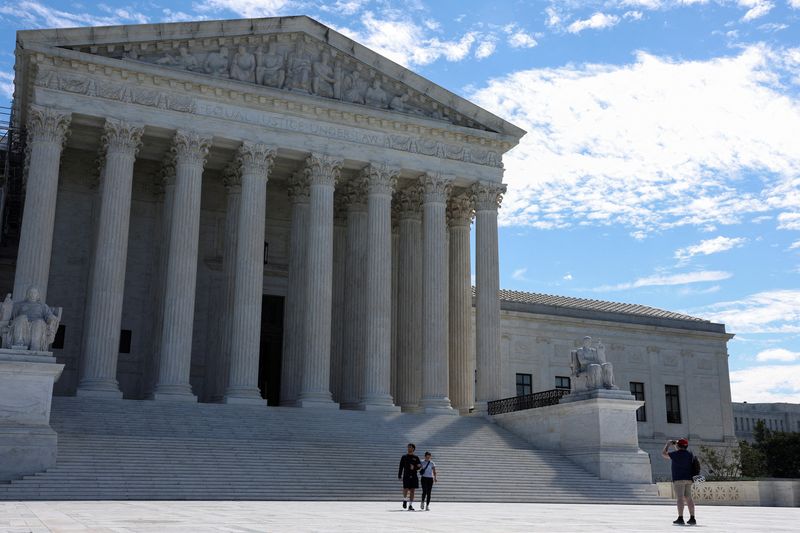By John Kruzel
WASHINGTON (Reuters) -The U.S. Supreme Court on Monday declined to hear an American steel importer's bid to invalidate tariffs on certain steel products based on the argument that former President Donald Trump exceeded his authority in imposing them in 2020.
The justices turned away an appeal by Irving, Texas-based PrimeSource Building Products of a lower court's decision to uphold a 25% tariff on some steel derivatives, such as nails and fasteners, put in place by Trump on national security grounds and now defended by President Joe Biden's administration.
During Trump's presidency, the United States placed multiple rounds of tariffs on steel products starting in 2018 after then-Commerce Secretary Wilbur Ross found that imports threatened national security by eroding demand for U.S. steel and depressing the use of domestic steel-producing capacity.
Trump in March 2018 invoked a Cold War-era trade law in ordering a 25% tariff on various imported steel articles including flat-rolled products, tubes and pipes. In January 2020, Trump ordered that the tariffs apply also to derivatives of the earlier-covered steel articles.
PrimeSource, St. Louis-based Huttig Building Products and Omani company Oman Fasteners challenged the tariffs on steel derivatives, arguing that the U.S. Congress never granted the president broad power over foreign trade to impose them.
The Manhattan-based U.S. Court of International Trade struck down the steel derivatives tariffs in 2021, saying the White House missed statutory deadlines to impose them.
But the Washington-based U.S. Court of Appeals for the Federal Circuit in February reversed that decision, citing its own 2022 ruling that presidents are authorized to impose "contingency-dependent" tariff increases to fulfill their original national security objectives, if those objectives remain valid.
Trump imposed the 2020 tariffs to "close a loophole exploited by steel-derivatives importers ... to address a specific form of circumvention," Judge Richard Taranto wrote in the Federal Circuit's decision.
Biden's administration had urged the Supreme Court not to take up the appeal.
PrimeSource appealed to the Supreme Court in July. Oman Fasteners filed a separate appeal on Oct. 20 that is currently pending.
In imposing steel tariffs in 2018, Trump invoked Section 232 of the Trade Act of 1962, which allows a U.S. president to restrict imports of goods critical to national security. Exemptions were granted to some countries. The tariffs became an irritant in foreign relations including with European allies.
Trump at the time said the tariffs were necessary for national security to maintain healthy domestic production, and said the United States was committed to building its ships, planes and other military equipment with American steel.
During his presidency, Trump rattled the world trade order by imposing unilateral tariffs to combat what he called unfair trade practices by China, the European Union and other major U.S. trading partners. China and some other countries retaliated by imposing tariffs on U.S. goods.
The Supreme Court in March turned away a challenge to the 2018 tariffs by a group of U.S.-based steel importers. The justices in 2022 refused to hear a separate challenge by steel companies to Trump's 2018 decision to double tariffs on steel imports from Turkey, also on national security grounds.
